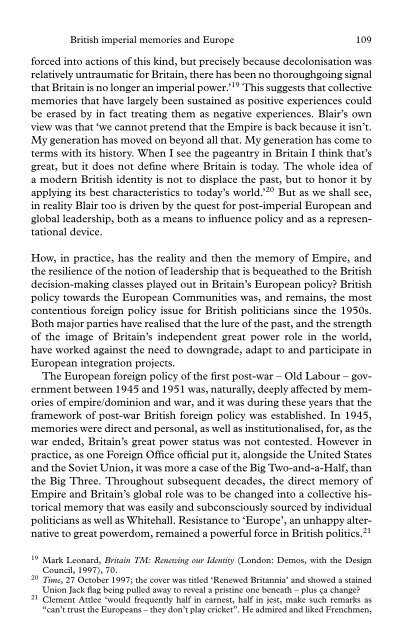Memory and Power in Post-War Europe: Studies in the Presence of ...
Memory and Power in Post-War Europe: Studies in the Presence of ...
Memory and Power in Post-War Europe: Studies in the Presence of ...
You also want an ePaper? Increase the reach of your titles
YUMPU automatically turns print PDFs into web optimized ePapers that Google loves.
British imperial memories <strong>and</strong> <strong>Europe</strong> 109<br />
forced <strong>in</strong>to actions <strong>of</strong> this k<strong>in</strong>d, but precisely because decolonisation was<br />
relatively untraumatic for Brita<strong>in</strong>, <strong>the</strong>re has been no thoroughgo<strong>in</strong>g signal<br />
that Brita<strong>in</strong> is no longer an imperial power.’ 19 This suggests that collective<br />
memories that have largely been susta<strong>in</strong>ed as positive experiences could<br />
be erased by <strong>in</strong> fact treat<strong>in</strong>g <strong>the</strong>m as negative experiences. Blair’s own<br />
view was that ‘we cannot pretend that <strong>the</strong> Empire is back because it isn’t.<br />
My generation has moved on beyond all that. My generation has come to<br />
terms with its history. When I see <strong>the</strong> pageantry <strong>in</strong> Brita<strong>in</strong> I th<strong>in</strong>k that’s<br />
great, but it does not def<strong>in</strong>e where Brita<strong>in</strong> is today. The whole idea <strong>of</strong><br />
a modern British identity is not to displace <strong>the</strong> past, but to honor it by<br />
apply<strong>in</strong>g its best characteristics to today’s world.’ 20 But as we shall see,<br />
<strong>in</strong> reality Blair too is driven by <strong>the</strong> quest for post-imperial <strong>Europe</strong>an <strong>and</strong><br />
global leadership, both as a means to <strong>in</strong>fluence policy <strong>and</strong> as a representational<br />
device.<br />
How, <strong>in</strong> practice, has <strong>the</strong> reality <strong>and</strong> <strong>the</strong>n <strong>the</strong> memory <strong>of</strong> Empire, <strong>and</strong><br />
<strong>the</strong> resilience <strong>of</strong> <strong>the</strong> notion <strong>of</strong> leadership that is bequea<strong>the</strong>d to <strong>the</strong> British<br />
decision-mak<strong>in</strong>g classes played out <strong>in</strong> Brita<strong>in</strong>’s <strong>Europe</strong>an policy?British<br />
policy towards <strong>the</strong> <strong>Europe</strong>an Communities was, <strong>and</strong> rema<strong>in</strong>s, <strong>the</strong> most<br />
contentious foreign policy issue for British politicians s<strong>in</strong>ce <strong>the</strong> 1950s.<br />
Both major parties have realised that <strong>the</strong> lure <strong>of</strong> <strong>the</strong> past, <strong>and</strong> <strong>the</strong> strength<br />
<strong>of</strong> <strong>the</strong> image <strong>of</strong> Brita<strong>in</strong>’s <strong>in</strong>dependent great power role <strong>in</strong> <strong>the</strong> world,<br />
have worked aga<strong>in</strong>st <strong>the</strong> need to downgrade, adapt to <strong>and</strong> participate <strong>in</strong><br />
<strong>Europe</strong>an <strong>in</strong>tegration projects.<br />
The <strong>Europe</strong>an foreign policy <strong>of</strong> <strong>the</strong> first post-war – Old Labour – government<br />
between 1945 <strong>and</strong> 1951 was, naturally, deeply affected by memories<br />
<strong>of</strong> empire/dom<strong>in</strong>ion <strong>and</strong> war, <strong>and</strong> it was dur<strong>in</strong>g <strong>the</strong>se years that <strong>the</strong><br />
framework <strong>of</strong> post-war British foreign policy was established. In 1945,<br />
memories were direct <strong>and</strong> personal, as well as <strong>in</strong>stitutionalised, for, as <strong>the</strong><br />
war ended, Brita<strong>in</strong>’s great power status was not contested. However <strong>in</strong><br />
practice, as one Foreign Office <strong>of</strong>ficial put it, alongside <strong>the</strong> United States<br />
<strong>and</strong> <strong>the</strong> Soviet Union, it was more a case <strong>of</strong> <strong>the</strong> Big Two-<strong>and</strong>-a-Half, than<br />
<strong>the</strong> Big Three. Throughout subsequent decades, <strong>the</strong> direct memory <strong>of</strong><br />
Empire <strong>and</strong> Brita<strong>in</strong>’s global role was to be changed <strong>in</strong>to a collective historical<br />
memory that was easily <strong>and</strong> subconsciously sourced by <strong>in</strong>dividual<br />
politicians as well as Whitehall. Resistance to ‘<strong>Europe</strong>’, an unhappy alternative<br />
to great powerdom, rema<strong>in</strong>ed a powerful force <strong>in</strong> British politics. 21<br />
19 Mark Leonard, Brita<strong>in</strong> TM: Renew<strong>in</strong>g our Identity (London: Demos, with <strong>the</strong> Design<br />
Council, 1997), 70.<br />
20 Time, 27 October 1997; <strong>the</strong> cover was titled ‘Renewed Britannia’ <strong>and</strong> showed a sta<strong>in</strong>ed<br />
Union Jack flag be<strong>in</strong>g pulled away to reveal a prist<strong>in</strong>e one beneath – plus ça change?<br />
21 Clement Attlee ‘would frequently half <strong>in</strong> earnest, half <strong>in</strong> jest, make such remarks as<br />
“can’t trust <strong>the</strong> <strong>Europe</strong>ans – <strong>the</strong>y don’t play cricket”. He admired <strong>and</strong> liked Frenchmen,
















